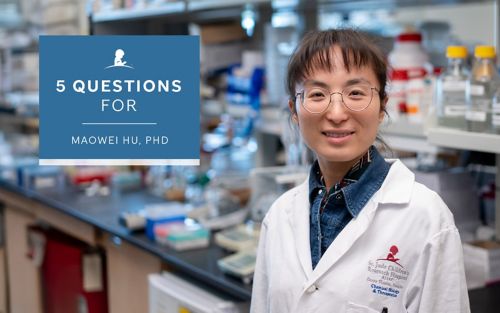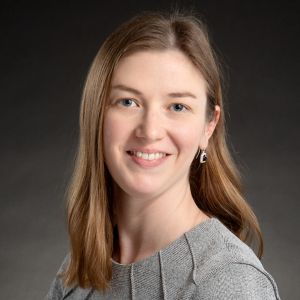St. Jude Family of Websites
Explore our cutting edge research, world-class patient care, career opportunities and more.
St. Jude Children's Research Hospital Home

- Fundraising
St. Jude Family of Websites
Explore our cutting edge research, world-class patient care, career opportunities and more.
St. Jude Children's Research Hospital Home

- Fundraising
5 Questions for Maowei Hu, PhD

Maowei Hu, PhD, is using her postdoc at St. Jude to leverage her background in chemistry to contribute to the identification and creation of next generation therapeutics.
This question-and-answer series explores the motivations, inspirations and accomplishments of investigators at St. Jude. Maowei Hu, PhD, is a postdoctoral researcher in the laboratory of Daniel Blair, PhD, in the St. Jude Department of Chemical Biology & Therapeutics. Her research focuses on making molecules and finding their functions in the context of diseases.
1. Why did you decide to become a scientist?
I grew up in rural China, where I did not have a lot of exposure to science or scientists and did not know what exactly they did. Nevertheless, I found a window into this world through television and books. This is what inspired me to become a scientist. When I grew up, the rose-tinted glasses came off as I began to learn what scientists really do. The reality of being a scientist is not quite as shiny as what I saw or read about but is marked instead by struggle and the need to persevere through failure. However, learning about these challenges did not change the fact I still wanted to be a scientist.
Science allows me to follow my curiosity, and my passion for it brings me joy. The impact of fundamental science isn’t always immediately clear, but every single step contributes to advancing our greater understanding of the world. The Department of Chemical Biology & Therapeutics bridges chemistry with fundamental biological insights to advance our ability to create new medicines. Even though we don’t work on the front line of patient care, our contributions will ultimately yield the technologies and insight to advance cures.
When people ask me why I work so hard, for me, it comes down to a desire to understand what’s happening, to find out whether our hypothesis is true (or false) and to discover the information that will shape our next exciting experiment. I’m certainly happy when our cutting-edge work is published in a top-tier journal, but there is no better validation than when your peers benefit from the new knowledge your work generates.
2. What questions are you trying to answer through your research?
“Finding cures. Saving children,” drives our entire institution. This work needs people from across St. Jude to work together collaboratively. In our department, we are working diligently toward finding cures. At the frontier of making more effective medicines, we are motivated by a core frustration: making molecules takes a lot of time and a whole lot of expertise. To make new and more effective medicines, this must change. My recent work broke down a longstanding barrier to progress centered around comparing the outputs of the chemical reactions we use to build the small organic molecules that make up many important medicines. In this work, published in Nature last year, we developed a fast analytical method that can analyze crude reactions at the pace of thousands of chemical reactions per day — as fast as we can make them. With this advance in hand, my ongoing work involves connecting these rapid chemical synthesis tools to methods that allow us to find and optimize new biological functions at the speed of screening thousands of compounds daily.
3. Why did you decide to join a laboratory at St. Jude?
St. Jude is a leading children’s research hospital, but what made it stand out for me was its shared mission and resources. Among academic institutions, even the most prestigious places can struggle to find the resources to support high-risk science. In industry, profits drive the direction of research. Here at St. Jude, we have the resources that we need and are not led by profit but to fulfill an important purpose: to advance the treatment and means of prevention of catastrophic pediatric diseases. At St. Jude, we can pursue the scientific questions we deem necessary and approach them with urgency. Supported by our environment, we can dig deep and collaborate broadly to seek out the answers.
On a personal note, I have two nieces and one nephew whom I love dearly. I hope every child can grow up happily and healthily — sadly, that is not yet the case. When I realized I could contribute toward this important goal, it attracted me instantly. I accepted the offer the moment I got it. I couldn’t think of anything better than to be part of the work that St. Jude does. Now, I have been here 20 months, and I appreciate the opportunities that allow me to do the science I love and tackle questions in fundamental science to achieve our mission. I like to imagine that, one day, the chemicals we make will be used to cure diseases.
4. Tell me about a teacher, mentor or colleague who has helped you in your career — how important was their influence on your career path?
Looking back on my scientific journey, I realize that many people have helped me to this point. During the last stage of my PhD, I had to switch labs. My new advisor, Lisa Berreau, PhD, Utah State University (USU) vice president for research, was from a completely different background to my thesis work but was still able to guide me as I finished my thesis dissertation. She made time for me in her busy schedule; I would explain my electrochemistry work to her, and she would ask me scientific questions to guide my work forward.
She made me realize that the way I was doing science was floating on the surface. She helped me learn how to think like a scientist, questioning what the essential reason was for a scientific phenomenon to happen. This one semester of training from Lisa shaped me into a strong person with a sharp mind. It proved beneficial when I joined St. Jude and had to learn the biology part of being in the Department of Chemical Biology & Therapeutics. The last time I learned biology was 15 years ago when I was in high school, but at 32 years old, I had to learn from scratch. I remembered what Lisa showed me, that it is possible to learn new things quickly, drawing on her advice from when she helped me revise hundreds of pages of my dissertation.
Moving from Utah to Memphis, life changed a lot. However, I’ve been lucky to work with my principal investigator (PI) Daniel Blair, PhD. I joined his lab right after he started it, having just completed his postdoc, so we were both highly motivated and shared common values about how high levels of effort yield exceptional results. This shared dedication is how we were able to rapidly make discoveries to push the field of chemistry to move faster. Our work requires learning many new skills and techniques, but moving into this new space never felt hard. One of the things Daniel says is that the only person we should compare ourselves against is who we were yesterday — and if we have improved (even a little bit), that’s a win. I’m glad I joined his lab and am working with him. The new techniques I’ve learned and the knowledge I’ve gained have resulted in some of the best work I’ve ever done. I feel like a kid who gets to explore a wonderful new chemical realm that may lead to cures for diseases and someday even save children.
5. Where do you draw inspiration as an investigator when you encounter obstacles or frustrations in the lab?
Like a kid figuring out this beautiful world for the first time, curiosity drives me to explore, learn and innovate. Being a scientist allows me to do this, but I’m still constantly challenged. I fail a lot and often, but that is the key to success in science. Each new failed experiment helps us to rule out one wrong possibility and take another step toward the truth. The knowledge and experience we gain from these challenges lead us in the right direction. My colleagues are also a driving force propelling me forward. I believe the discussions (often disagreements) we have are what make our science better.
Daniel and I have many discussions in which we defend our ideas — fight for them — but we can also accept other views. The moment we try to convince others is the moment we can expose the holes in the design of our experiments or our reasoning. Creative environments thrive on professional conflict; when we challenge each other, we refine our work iteratively. Science is not one person’s journey; it’s teamwork. We contribute our expertise and settle disagreements to make the science better than it was before. It seems hard at first glance, but this way, you can present your best work and anticipate any gaps potential reviewers might bring up so that you can solve them before they become an issue. Like running a marathon, every step matters. But because we enjoy the process, every discussion and every experiment that leads up to it makes the moment we cross the finish line much more precious. Nothing can compare to that fulfilling feeling.







